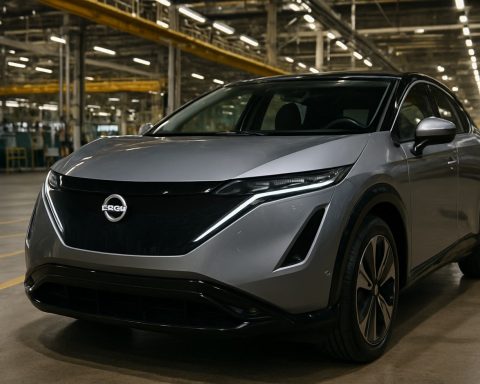- Toyota and Mercedes-Benz have issued urgent vehicle recalls in Australia over critical safety defects.
- Over 830 Toyota Tundras (2022–2024) are affected by a reversing light circuit board flaw, risking short-circuits, non-working lights, and reversing camera malfunctions.
- Malfunctioning reversing lights on heavy vehicles like the Tundra create potential hazards for drivers and pedestrians, especially in busy areas.
- Mercedes-Benz’s recall involves select AMG C-Class, EQE, EQS, GLC, and SL models for faulty fuse boxes that could cause sudden power loss or fires.
- Some previous Mercedes-Benz repairs used defective replacement parts; new fixes are offered free at dealerships.
- Owners are urged to check their VIN, review recall alerts, and schedule prompt repairs to ensure ongoing vehicle safety.
Thunderclouds gather over the automotive landscape as two titans—Toyota and Mercedes-Benz—rush to address serious safety defects in some of their most coveted vehicles. The recalls, stretching from the robust Toyota Tundra pickups to the luxurious Mercedes-Benz AMG models, have sent ripples through showrooms and highways across Australia.
Toyota, esteemed for reliability, finds itself grappling with an unusual flaw in over 830 Tundras manufactured between 2022 and 2024. In the heart of the truck’s electrical system, engineers discovered a vulnerability: delicate circuit boards within the reversing lights are susceptible to moisture. When water sneaks in, the system can short-circuit, plunging the rear into unexpected darkness and risking glitches like activating the reversing camera while driving forward. Imagine—2.8 tonnes of steel suddenly backing out, silent and unseen in a crowded parking lot.
The implications are as grave as the statistics: malfunctioning reversing lights can tip a routine maneuver into a calamity, endangering drivers, pedestrians, and fellow motorists. As a result, www.toyota.com is urgently alerting affected owners, promising complimentary repairs once replacement parts land in service centers. Officials urge drivers not to ignore recall notifications, and VINs linked to the issue are listed in the national Vehicle Recalls database.
Meanwhile, Mercedes-Benz faces a more incendiary threat. Their latest recall encompasses the C-Class, the electric EQE and EQS series, the athletic GLC, and the flagship SL roadsters—specifically, models like the AMG C43, C63 S, EQE 53, EQS 53, and SL63. The culprit: a potentially defective fuse box. In rare but possible cases, the compromised component could lead to sudden power loss or, far worse, spark a vehicle fire.
The complexity doesn’t end there. Two separate but overlapping recall notices—concerning just 37 vehicles combined—hint at replacement parts themselves being flawed in earlier corrective attempts. Mercedes assures owners the new rectification is free of charge and has published comprehensive VIN lists for transparency. For those who prize engineering precision, the message is clear: visit your authorized dealership, safeguard your investment, and restore the serenity that luxury motoring should bring.
Takeaway: These recalls underscore the critical nature of vehicle safety and the rigor automakers must uphold. Whether you treasure the raw strength of a Tundra or the refined prowess of a Mercedes-Benz, vigilance is key. Check your VIN, heed recall notifications, and trust in the ongoing evolution of automotive engineering to keep you— and everyone sharing the road—safe. For ongoing updates and owner resources, visit www.mercedes-benz.com and www.toyota.com.
When even industry leaders recall their own, it serves as a reminder: in a world of innovation, diligence never takes a back seat.
Hidden Dangers: What Toyota and Mercedes-Benz’s Latest Recalls Reveal About Automotive Safety in 2024
—
Overview
Toyota and Mercedes-Benz—two global automotive giants—are simultaneously recalling vehicles due to serious safety risks. The scale ranges from the hugely popular Toyota Tundra to exclusive, high-performance Mercedes-Benz AMG models. But beyond the headlines, what does this mean for drivers, and what other key facts should consumers know right now?
—
Key Facts You Need to Know
1. Expanded Context on Toyota Tundra Recalls
– Recall Details: Over 830 Toyota Tundra vehicles (model years 2022–2024) are affected.
– Problem: Reverse light circuit boards can let in moisture, causing electrical shorts. This may deactivate reversing lights or, alarmingly, trigger the reversing camera while driving forward—confusing drivers and endangering others.
– Further Concerns: Water ingress issues are often a sign of wider sealing or component design concerns. This vulnerability could affect other systems in the truck over time, reducing resale value and potentially resulting in more costly repairs.
– Industry Perspective: According to independent automotive reliability index scores, Toyota typically leads for electrical reliability, suggesting this recall is an outlier—but still highly significant (Source: Consumer Reports, J.D. Power).
– Additional Coverage: For ongoing recalls, official information, and how-to-respond details, visit the main Toyota resource page: Toyota.
2. Mercedes-Benz: Multiple Models, Higher Stakes
– Vehicles Impacted: Includes C-Class (C43, C63 S), electric EQE and EQS models (EQE 53, EQS 53), GLC, and SL63 roadsters.
– Fuse Box Flaw: Some installed fuse boxes may lead to sudden loss of power while driving—posing collision risks—or, in worst cases, electrical fires.
– Double Fault Risk: Past repair efforts may have replaced defective parts with new but equally faulty components due to overlapping recall notices.
– Affected Units: Only 37 units are affected this cycle, showing Mercedes-Benz’s rapid and focused response—yet underscores the precision expected at this luxury level.
– EV-Specific Risks: For the EQE and EQS electric models, high-voltage system failures elevate fire and shock hazards, a growing concern as the industry shifts toward electrification.
– Manufacturer Support: For verification and free repairs, owners should visit their local dealership or consult the primary Mercedes-Benz site: Mercedes-Benz.
—
Most Pressing Reader Questions—Answered
Q: How Serious Are These Defects?
Answer: Both defects can create acute safety threats in daily driving—losing lighting or power without warning can lead directly to collisions or even injuries. Electrical failures that could start fires are always top-priority recalls in the industry.
Q: How Do I Know If My Car Is Affected?
– Step 1: Find your car’s VIN (Vehicle Identification Number)—usually located near the windshield, driver’s door post, or in your registration documents.
– Step 2: Visit the national recall database or the manufacturer’s main website.
– Step 3: Enter your VIN to check recall status.
– Step 4: If flagged, contact your authorized dealer immediately for a repair appointment.
Q: What Should I Do While Waiting for Repair?
– Stay vigilant. Be alert for any dashboard warnings or unusual light/camera behavior (Toyota) or sudden power drops (Mercedes-Benz).
– Minimize risk. Avoid heavy rain or high-load conditions if possible.
– Don’t skip repairs. Prompt remedial action is far easier (and safer) than dealing with a malfunction on the road.
Q: Will These Recalls Affect Vehicle Value or Insurance?
Answer: Most properly remedied recalls will not dent resale value if repairs are logged. However, insurance premiums can increase if the vehicle has a history of unresolved recalls or if the defect leads to an accident prior to repair.
—
Industry Insights & Trends
Shift Toward Electrification Increases Recall Complexity
Defects in electric vehicles (like the Mercedes EQE & EQS) can carry higher stakes—battery fires are harder to extinguish, and component integration is more complex. Industry analysts warn this trend is likely to accelerate as more hybrid and EV models hit the market (Source: IEA Global EV Outlook 2023).
Proactive Recall Models
Manufacturers are leveraging advanced telematics and AI-based monitoring to spot emerging defect patterns much quicker than in the past. Toyota and Mercedes-Benz both invest heavily in digital service records and early-warning systems for recalls.
Security & Sustainability Considerations
– Security: Both automakers encrypt communications about recalls, reducing owner phishing or fraud risks.
– Sustainability: Damaged parts are typically recycled or disposed of following strict industry sustainability protocols—a growing requirement for OEMs.
—
Reviews, Comparisons & Limitations
– Toyota Reliability: Generally exceptional, but this flaw highlights new vulnerabilities in high-volume vehicles.
– Mercedes-Benz Precision: Luxury engineering usually sets the benchmark, but fuse/electrical recalls are becoming more common even among high-end brands.
– Recall Timing: Parts replacements may be delayed by supply chain issues—owners should ask dealers about estimated repair times.
—
Pros & Cons at a Glance
| | Pros | Cons |
|——–|——————————————————————|——————————————————|
| Toyota | Free repairs; fast communication; broad dealer network | Uncharacteristic electrical vulnerability |
| MBZ | Transparent; corrective efforts even for earlier repairs | Recall overlaps; potential for EV-specific risks |
—
Life Hacks & How-To Steps
4-Step Recall Management
1. Set calendar reminder to check for recalls annually—even for non-affected cars.
2. Keep your vehicle registration info updated with the manufacturer for direct notifications.
3. Photograph your VIN for quick reference.
4. Download the brand’s mobile app for instant alerts—Toyota and Mercedes-Benz offer recall tracking via their apps.
—
Quick Tips & Actionable Recommendations
1. Don’t ignore recall letters or emails. Even minor electrical issues can escalate quickly.
2. Ask for a replacement loaner vehicle if your dealer is waiting on parts for your repair.
3. Check insurance coverage for potential accident scenarios related to unresolved recalls.
4. Join owner forums for live info—crowdsourced experiences often alert you to unseen symptoms or delays.
—
Conclusion: Don’t Wait—Act
Automotive recalls, even for iconic brands like Toyota and Mercedes-Benz, are a reminder that safety and vigilance aren’t just buzzwords. By following best practices—responding to recalls, verifying repairs, and staying informed—drivers can help ensure their vehicles stay as safe and reliable as the automaker intended.
Bookmark the official recall pages for the latest updates:
– Toyota
– Mercedes-Benz
Remember: In the fast-evolving world of automotive technology, being proactive isn’t optional—it’s essential.












